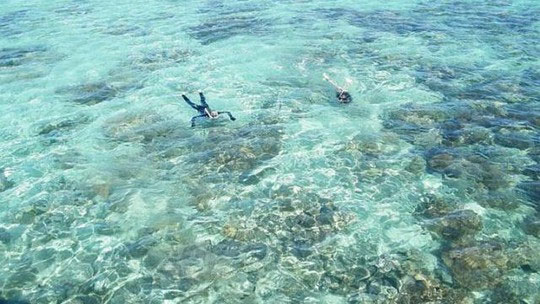Corals 'eat plastic' adds to environmental concerns
Great Barrier Reef coral reefs, Queensland-Australia eat plastic debris in the ocean. This new finding worries scientists because this undigested food can harm this marine organism.
The Great Barrier Reef was recognized as a World Natural Heritage in 1981. The CNN called it one of the seven natural wonders of the world . Recently, a research team in Queensland conducted the first study. in the world about the plastic debris ingestion of coral populations.

Increased anxiety when detecting plastic cracking corals.(Photo: MADIHAH HAMID)
This study is published in the journal Marine Biology. Accordingly, scientists found that when placing corals from coral reefs on contaminated water with plastic chips, corals ate them at a slightly lower rate than the proportion of zooplankton they eat. or other small sea creatures. As a gut, corals keep these plastic chips at least 24 hours after swallowing them.
Researchers from James Cook University and Queensland University of Technology collected live coral samples from various sources around Orpheus Island during the period from April to May 2013, below the depth of 5 meters of sea water to serve research. save this. They put them in an aquarium and put them in green plastic chips to see if they were eating. According to the analysis, about 21% of coral individuals eat at least 1 plastic chip and an individual eats 3 small pieces of plastic chips.
The authors of the research group believe that corals can be exposed to much in many ways, especially when pollution is rising as much as now, human waste is released into the sea more and more. Especially when the tide is low, the waste is more likely to be exposed to coral reefs. However, it is still unclear whether plastic rubble has a negative impact on coral bio-energy and growth if eaten or affects coral growth in general. This also requires research time.
Between 2008 and 2014, in an effort to protect the Great Barrier Reef, about 683,000 volunteers often collect garbage from the beach near the reef.
- Corals reject shrimp eggs, choose to eat micro-plastic seeds
- India banned the sale of plastic bags for the environment
- Startled with the amount of plastic you are eating into your mouth every year
- France is the first country to ban the sale of plastic cups and plates for environmental reasons
- The shocking images of the consequences of plastic waste, environmental pollution with the natural world
- Haunting because the world is flooded with plastic waste
- 101 ways to replace plastic bags from the world experience
- Europe charged with plastic bag death
- Plastic pipes will soon be extinct in the world?
- Vietnam is the top 5 countries that discharge most plastic waste into the sea
- Plastic bottles - gold mines in Taiwan
- Tooth decay and coral reef death
 Surprised: Fish that live in the dark ocean still see colors
Surprised: Fish that live in the dark ocean still see colors Japan suddenly caught the creature that caused the earthquake in the legend
Japan suddenly caught the creature that caused the earthquake in the legend A series of gray whale carcasses washed ashore on California's coast
A series of gray whale carcasses washed ashore on California's coast Compare the size of shark species in the world
Compare the size of shark species in the world